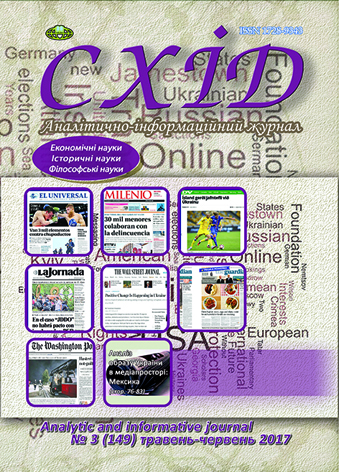The Phenomenon of Environmental Classics (Philosophical and Methodological Analysis)
DOI:
https://doi.org/10.21847/1728-9343.2017.3(149).108360Keywords:
environmental awareness, humanities, environmental writing, environmental classics, literary canonAbstract
The article is dedicated to the analysis of the phenomenon of environmental classics. It is shown that humanities play a growing role in formation of ecological consciousness of the population, supplementing natural sciences knowledge on the way of raising public environmental awareness and development of integrated system of environmental education. It is manifested in the forms, first, of more active appeal of those who are responsible for environmental education to humanities; second, of direct concern to artists and writers by environmental problems and aspiration to contribute in their solving by available means (eco-music, eco-art, eco- and environmental writing). The phenomenon of formation of environmental classics is considered with the reference to the book "Silent Spring" (Rachel Carson, 1962). It is shown its public and educational significance.
Ecological literature and ecological classics attract more and more attention of researchers as a material for expanding the theoretical basis of environmental protection, sustainable development, eco-education and education for sustainable development, and for solving practical tasks in the areas of nature conservation, saving attitude to natural resources And eco-education. The canoners of literature on nature, or environmental literature, are advocates of the rights of nature and human rights to a clean and safe environment, academic and educational communities, who use the criteria of the social significance of the text, its influence on the worldview and the attitude of the reader, but not totalitarian authority or leader. Rachel Carson, an example of the analysis of the "Silent Spring" phenomenon, has proved that the ecological classics are determined by the important meanings that it carries to the reader.
Downloads
References
Habermas, Yu. (2011), Post-Mechanical Physical Thinking [translat.], Dukh i Litera, Kyiv, 280 p. (ukr).
Gadamer, H.-G. (1988), Truth and method: the basis of philosophical hermeneutics [translat.], Progress, Moscow, 704 p. (rus).
Gor, A. (2001), Land in equilibrium. Ecology and the human spirit, Agenda for the 21st Century and the Institute for Sustainable Development, Intelsfera, [translat.] Kyiv, 404 p. (rus).
Medavar, P. & Medavar, J. (1983), The Science of the Living P. P. Medavar, Mir Publishing, 207 p. (rus).
Fedoriv, U. M. (2008), Literary canon as a phenomenon of literary memory, Scientific works: Scientific-methodical journal. Vol. 80, Vyp. 67. Philology. MSUU Petra Mohyla Press, 6-9 (ukr).
Hales, Catherine N. (2013), How We Became People: The Virtual Bodies in Cybernetics, Literature and Computer Science [translat.], Nika-Center, Kyiv, 426 p. (ukr).
Bell, M. (1998), An Invitation to Environmental Sociology, Pine Forge Press, California, 342 p. (eng).
Bower, S. Environmental Art, available at: http://animatingdemocracy.org/sites/default/files/SBower%20Trend%20Paper.pdf
Griswold, E. (2012), How ‘Silent Spring’ Ignited the Environmental Movement, The New York Times Magazine. – Sept.21, 2012, available at: http://www.nytimes.com/2012/09/23/magazine/how-silent-spring-ignited-the-environmental-movement.html?pagewanted=all
Meador, R. 25 classics of environmental writing to help with your summer reading list. Available at: http:// www.minnpost.com/earth-journal/2013/07/25-classics-environmental-writing-help-your-summer-reading-list
Morriss, Andrew P. Silent Spring After 50 Years, available at: https://fee.org/articles/silent-spring-after-50-years/
Primack, R. B. (1995), Primer of Conservation Biology, Sinauer Associated Ins., Massachusetts, 277 р.(eng).
Rachel Carson and Her Book That Changed the World, available at: http://www.rif.org/documents/us/Rachel_Carson.pdf
Downloads
Published
How to Cite
Issue
Section
License
Copyright (c) 2017 Nelya Filyanina

This work is licensed under a Creative Commons Attribution-NonCommercial-NoDerivatives 4.0 International License.
1. Authors bear responsibility for the accuracy of facts, quotations, numbers and names used.
2. Manuscripts are not sent back.
3. The publisher does not always agree with the authors' opinion.
4. The authors reserve the right to authorship of the work and pass the first publication right of this work to the journal under the terms of a Creative Commons Attribution-NonCommercial-NoDerivatives 4.0 International License. This license allows others to distribute (copy) the published work for non-commercial purposes, provided there is mandatory attribution to its authors and a link to the first publication in our journal.
5. The authors have the right to conclude separate supplement agreements that relate to non-exclusive work distribution in the form in which it has been published by the journal (for example, to upload the work to the online storage of the journal or publish it as part of a monograph), provided that the reference to the first publication of the work in this journal is included.

